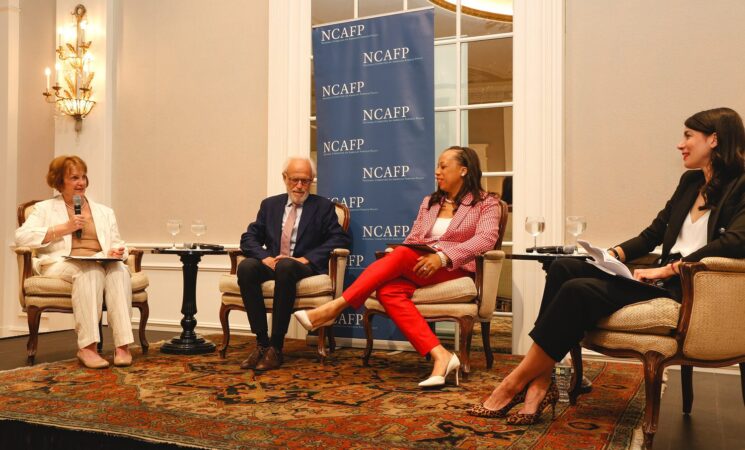
Ms. Castleberry-Hernandez sharing her thoughts with her fellow panelists
On June 13th, the National Committee on American Foreign Policy (NCAFP) hosted a panel discussion on shifting geopolitics in the Middle East following the peace agreement between Saudi Arabia and Iran that was brokered by China. The panel included Ms. Asha Castleberry-Hernandez, former Senior Advisor to Assistant Secretary of State of Near Eastern Affairs and Kuwait Desk Officer at U.S. Army Central, Ms. Holly Dagres, Nonresident Senior Fellow at the Atlantic Council and Editor of IranSource and The Iranist, as well as Ambassador (ret.) Martin Indyk, the Lowy Distinguished Fellow in U.S.-Middle East Diplomacy at the Council on Foreign Relations and former U.S. Ambassador to Israel. Ambassador (ret.) Susan Elliott, President & CEO of the NCAFP, moderated the panel.
The panelists offered their thoughts on the state of relations between Iran and Saudi Arabia following the Chinese brokered deal between the two countries, and the future role of U.S. diplomacy in the region. Their varied experiences, informed by time spent in many Gulf nations, brought nuance and rich understanding to a challenging set of issues. It was agreed that the deal between Saudi Arabia and Iran is still in its infancy, and before being judged on its efficacy, it needs proven results before declaring a new era of rapprochement. Although many details appear opaque, increased security and stability in the Middle East is a welcomed occasion.
Ambassador Indyk suggested that if the U.S. plans to disconnect from the Middle East, Washington should prepare for others to fill the void, particularly during a multipolar competitive environment in the region. For future engagement, the U.S. should rethink its position as an “off-shore balancer,” offering confidence about our foreign policy commitments to our allies and partners while concurrently expecting more responsibility from them as well. As Ms. Castleberry-Hernandez said, it was “no surprise” that China would become a neutral broker in the region; the Biden-Harris administration has reprioritized U.S. strategic competition with China in the Indo-Pacific as well as in Europe, and distantly kept a close watch on the Middle East.

The panelists engage with audience members after the discussion
While historically Iran kept a fluid policy position, easily slipping between Eastern and Western partnerships, it has been slighted by the U.S. reneging the Joint Comprehensive Plan of Action and largely ignored by Europe. Ms. Dagres poignantly mentioned that as Iran muscles a foreign policy strength in the region, the internal struggles confronting ordinary Iranians by the regime are too large to dismiss.
A Q&A session followed the panel discussion, in which attendees asked a series of questions related to China's role as a mediator in the Middle East, and how shifting relations change the political calculus for both the U.S. and its closest ally in the region, Israel.

